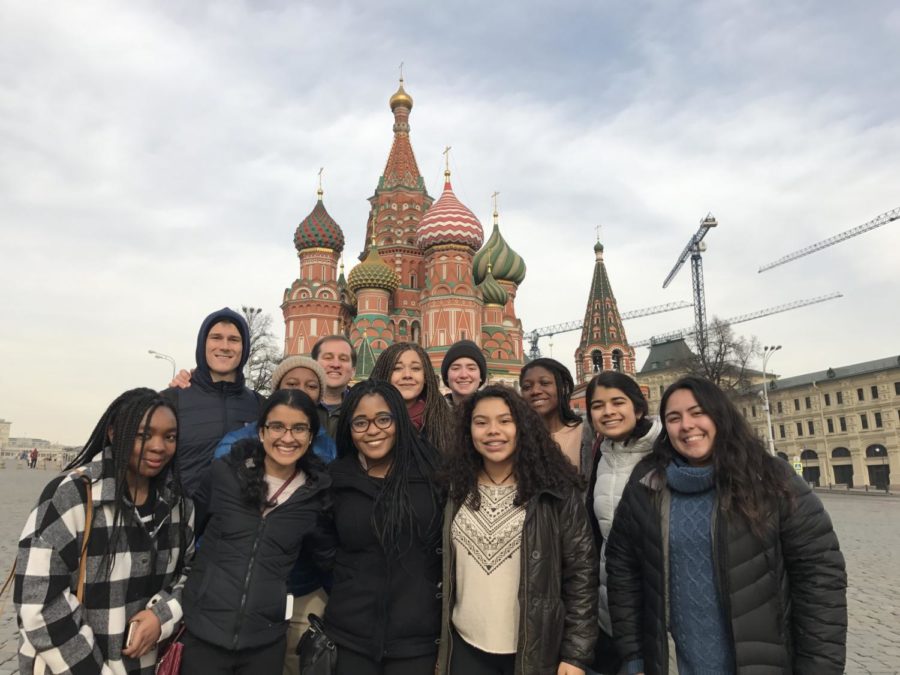A Conversation with Mr. Keith Moon on the Russia-Ukraine Crisis
Mr. Moon on a travel program with students in Russia in 2017.
Keira Cason ’24 sat down with Mr. Keith Moon, instructor in Russian history and literature, for an interview on his insights on the Russia-Ukraine war.
What are your preliminary thoughts or opinions on the war?
Though I do not think the war is a great surprise, I think it is remarkably sad and frustrating that this is where we are. I was looking at a speech that Putin gave in 2004, where he was talking about a lot of the same things he said in February regarding Ukraine, what belongs to Russia, and so on. Putin has been telegraphing that he was going to do this for the past twenty years, and it is incredibly sad that it came to be true. This war has brought nothing good. Not only have the [Russian forces] been bombing cities, but also intentionally killing civilians. The end of the war would be good for millions of people, including most Russians.
What are your biggest concerns at the moment?
Perhaps the biggest concern I have is that I do not see an easy way for Putin back out of this war without losing face on the world stage, which I do not think will happen. We may be looking at years and years of entrenched occupation in parts of Ukraine. I also have a friend who lives in Ukraine, so on a personal level, I want him to be safe.
How do you see the war panning out?
Thus far, I think Putin has learned pretty quickly that he can not force Ukraine to capitulate. He cannot take the capital city, so now he will focus his attention on the eastern provinces. He is very interested in the land bridge that connects Crimea to Russia, and since he has pretty much got that area right now, I think he will fight hard to keep it. This, however, will not make the war stop. The Ukrainians will not be satisfied with simply giving up that territory or those people, so they will keep fighting. I think this will end up being a long and bloody mess. Though not mentioned much on the news, there has been a war going on in Ukraine for the better part of the last ten years. It is nothing compared to what is happening currently, but it goes to show the resilience of Ukrainians. They will not give up on fighting for their territory, and Russia will most likely not give it back without a fight. What we will see is a long stalemate where people will continue to be in danger.
What are the possible implications of this on the U.S. or the world?
On a superficial level, we are going to feel the war in terms of prices and goods. But in terms of the real safety of the United States, I am not worried. Early on, Putin made some comments about nuclear weapons, but I doubt that will happen. I do not think that the U.S. will really enter this war, though the economic sanctions we placed on Russia are going to have an impact on the prices of things such as gas oil. Ukraine also produces a lot of the world’s wheat, so that will affect food prices. Because of these factors, I think we will continue to see spikes of inflation and trouble with other commodities. Russia produces a lot of the world’s nickel and minerals, and we need those for all kinds of things. So at what point do we say we are simply not going to trade with this country? This restricted trade will certainly place an economic strain on all countries involved.
Can you speak to some of your personal connections to Russia and Ukraine, or elaborate on some of your friends and/or family that are deeply affected?
I have been to Russia twenty times, starting when it was part of the Soviet Union in 1983, and I have been to Ukraine twice. I teach Russian history and literature, and I have a lot of connections with people in Russia. I also have a friend named Evgeny who lives in Ukraine. His wife and kids went to Germany, but he could not leave, so I worry for him and his situation. I am amazed that I have not had much trouble staying in touch with people in Russia and Ukraine, but I’m concerned for all of them. What is happening is really tough for them economically, and they are going to face significant economic troubles – a recession, and probably even a depression coming around the corner. That will be tough on a lot of people, which is a shame because this war seems particularly unnecessary. That is troubling for the people of Russia. As for my friend Evgeny, I’m hoping he can survive and reunite with his family. He has two young daughters, seven and three, and I hope they can get themselves back together very quickly.
What are the most important takeaways from this crisis so far?
One of the most important takeaways of this crisis is that we should pay more attention to leaders of countries when they say outrageous things. Putin has been making outrageous claims regarding Ukraine for a long time, and many assumed that he would never actually follow through. As it turns out, he was very willing to follow through, which is extremely dangerous, and something we should pay attention to going forward. We could have seen this coming, and perhaps worked to help sooner. Many think that the era of nineteenth-century war was behind us, but we have not truly left it. While Russia is concentrating on Ukraine, Armenia and Azerbaijan, which are former Soviet republics, have begun fighting again, and these conflicts have gotten more serious and bloody. Though these territorial fights are still going on, many have just pretended that they are not. This is a moment where we need to recognize they are still happening.
How can our community get involved in supporting those affected?
A great way to get involved is to read the news and pay attention to what is going on. Every day the news has another headline about Ukraine, and though it sometimes seems impossible to read another article on this issue, I think it is critical for people to pay attention because this will be something that the world is going to be talking about and thinking about for a long time. We must stay updated on the news and the situation so we do not find ourselves in it again.
There are also lots of good organizations that are dedicated to supporting those affected. I have a good friend from Harvard who put together a great list of charities that are aiding not only Ukrainian refugees but also Ukrainians inside the country. These are all strong, reputable charities that guarantee the money that you give is ending up in the hands of those who need it. There are people who are in desperate need all over Europe. There are millions of people in Eastern Europe, many of whom are at risk of homelessness if the world does not help them. The world ought to do something for the 44 million Ukrainians who are going through such severe and heartbreaking struggles.





